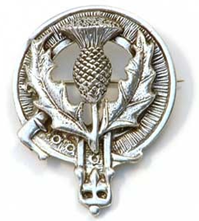|
Alexander Gordon, 4th Duke of Gordon
KT (18 June 1743 – 17 June 1827), styled Marquess of Huntly
until 1752, was a Scottish nobleman, described by Kaimes as the
"greatest subject in Britain", and was also known as the
Cock o' the North, the traditional epithet attached to
the chief of the Gordon
clan.
Alexander Gordon was born at Gordon
Castle, Fochabers, on 18 June 1743; the eldest son of Cosmo
Gordon, 3rd Duke of Gordon and his wife, Lady Catherine Gordon,
daughter of the 2nd Earl of Aberdeen. He was educated at Eton
and also possibly at Harrow. He succeeded as 4th Duke of Gordon
in 1752. His younger brother was Lord George Gordon who led the
Gordon Riots.
He was elected as a Scottish
representative peer from 1767. He was appointed a Knight of the
Thistle in 1775 and was created a Peer of Great Britain as Baron
Gordon of Huntley, of Huntley in the County of Gloucester, and
Earl of Norwich, in the County of Norfolk, in 1784. He was
Keeper of the Great Seal of Scotland from 1794 to 1806 and from
1807 to 1827. Between 1793 and 1827, he was Chancellor of King's
College, Aberdeen. In addition, he was Lord Lieutenant of
Aberdeenshire until 1808. He received the Order of the Thistle
from King George III on 11 January 1775. The Duke was a truly
enlightened grandee. He planned villages, improved his estates
and was well-regarded by his tenants.
He raised regiments (the 92nd Highlanders)
in 1794 for the American Rebellion and French Revolutionary
Wars. He was responsible for establishing the village of the new
village of Fochabers as well as for Tomintoul and Port Gordon in
Banffshire. He is also credited as the founder of the Gordon
Setter breed of dog, having popularized a 200 year old breed
during the 18th century and then formalized its breed standard
in 1820.
He was an
enthusiastic supporter and patron of the music of William
Marshall (1748-1833), a Scottish fiddler and composer, and
famous for his many strathspeys, who acted as steward of the
Gordon household. The tune, Cock of the North, may be one of
William Marshall’s compositions.
The Duke died suddenly at Mount Street,
Berkeley Square, on 17 June 1827 and was buried in Elgin
Cathedral.
The dance and ballad air was assumed into
martial repertory, the obvious connection being with the Gordon
Highlanders, whose military bands play it as the regimental
march past in quick time. It has been recorded that the melody
helped win Gordon Highlander Piper George Findlater the Victoria
Cross in 1897. It seems that while leading the charge storming
Dargai Heights with other pipers, he was shot through both legs;
"undaunted, he propped himself against a boulder, and continued
to play" the stirring air to encourage the successful action.
Another military story relates of its earlier use in the siege
of Lucknow during the Indian Mutiny of 1857. The British were
initially hard pressed and were for some time besieged in
various locations in the city by native Indians. Signals had
been regularly sent between the forces defending parts of the
besieged town, and those under attack in the Residency quarters.
A drummer boy named Ross, after the signaling was over, climbed
to the high dome from which signals were sent and despite
harassing fire from the Sepoys he sounded "Cock o' the North" in
defiance, rallying the English with his bravery (though being a
drummer, exactly how he 'sounded' the tune remains a mystery.)
The tune was used by the Scots poet Robert
Burns for his song "Her Daddie Forbad and Her Minnie Forbad."
In America, it was given to Bayard that there was an obscene New
England song to the tune called "Chase Me, Charlie," but he did
not hear it. It has been asserted that a trumpet version of the
tune was played at the execution of Mary Queen of Scots in 1587
although this cannot be substantiated.
|



